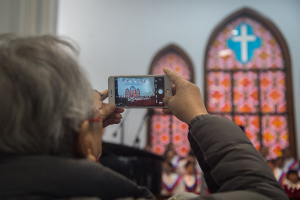Theologians Speak on Christian Involvement in Non-Christian Charities
Donations from Christian churches to charities affiliated with other faiths, such as Islam, have led some to wonder how far Christians should involve themselves in non-Christian charities and to what extent should they aid non-Christian religious groups.
In December of last year, Collegiate Church Corporation, a Christian charity located in New York, gave a much needed $100,000 donation to The Muslim Women's Institute for Research and Development, which oversees multiple food pantries that serve the needs of approximately 2,500 people.
Regarding whether Christians should aid non-Christian religious charities, Dr. Darrell L Bock, research professor of New Testament Studies at Dallas Theological Seminary, told The Christian Post that “strictly humanitarian aid” would be “appropriate.”
“Aid that is strictly humanitarian serves to make a point about Christian care for all people is appropriate,” said Bock. “The only concern would be to be sure the money is used for the intended goal and not something else.”
Dr. Mark Saucy, professor of Systematic Theology at Biola University, said that his chief concern of interfaith efforts was a lack of acknowledgement of Christian belief.
“I am not saying that every good deed of the Church has to conclude with a sermon,” said Saucy to CP.
“It should, however, be clear to the recipient in whose name they are receiving the benefit. The world has its humanitarian aid projects; the Church of Jesus Christ is about Jesus’ humanitarian aid projects.”
Regarding the Collegiate Church Corporation’s donation to the MWIRD, Saucy felt that it depended on how it “reflects on the name of Jesus Christ.”
“If it was made known to all those who receive aid through the Muslim office that it was from Christians that this aid was made available to them, then I would say OK to the donation,” said Saucy, adding that “Christ’s fame is raised, even through this Muslim outlet.”
“But without such notice I would not be in favor of the donation because the Holy Spirit’s passion and mission for the fame of Jesus Christ is not only muted, but also positively confused with the fame of another false god.”
On the issue of Christians being involved in non-Christian religious charities, Bock felt as with the monetary donations that if performing a secular service it was a nonissue.
“In some cultures where Christians are a minority or where direct Christian access is restricted, this is the only way for Christians to bring aid to one's neighbors in a concerted way,” said Bock.
“As long as there is no religious teaching that comes with the aid, then such care can show Christians' care in the community.”
By contrast, Saucy saw that Christians working for non-Christian religious charities “as contrary to Christians’ calling to advance the glory of Christ in the world.”
“By definition these charities, whether implicit or explicit in their modus operandi, are about the glory of a false god,” said Saucy.
“Partnering in this way with non-Christian religious charities appears to be counter to the mission of the Holy Spirit in the Church.”
Ultimately, both Bock and Saucy felt that Christians were called to do humanitarian acts as a service to the world in the name of Jesus Christ.



























